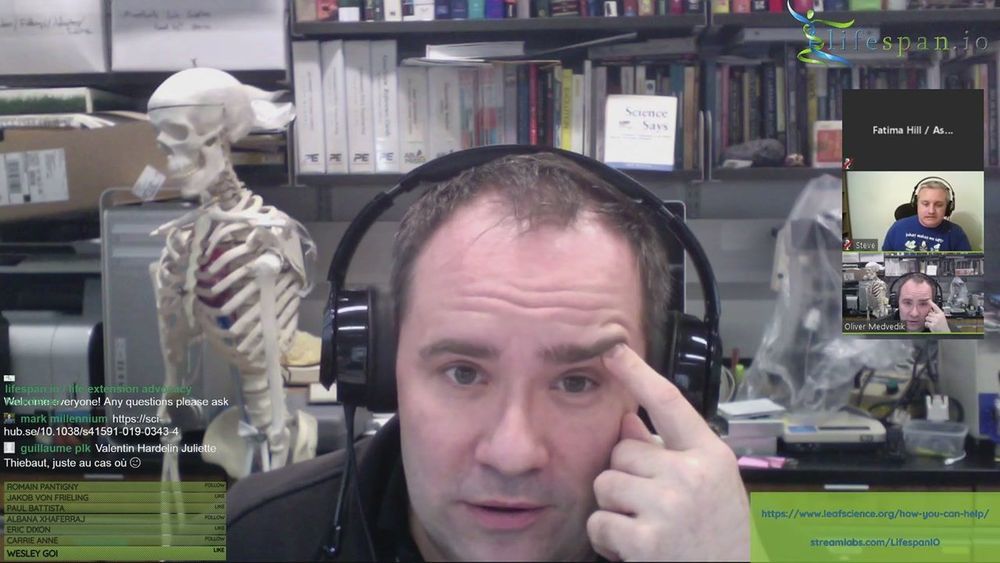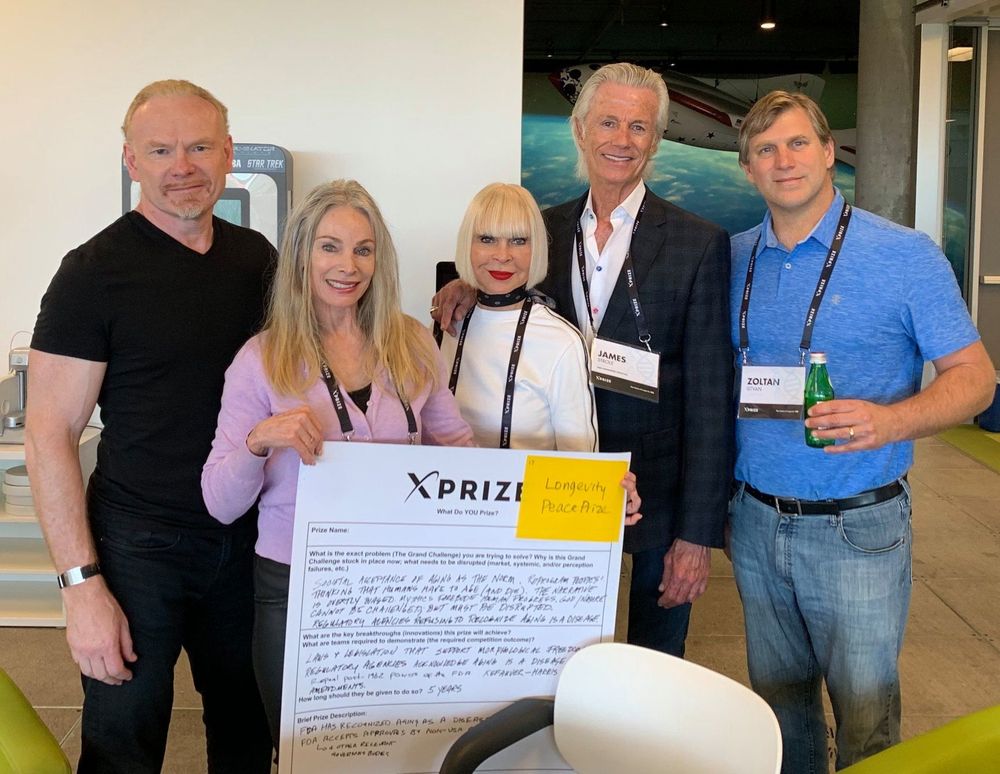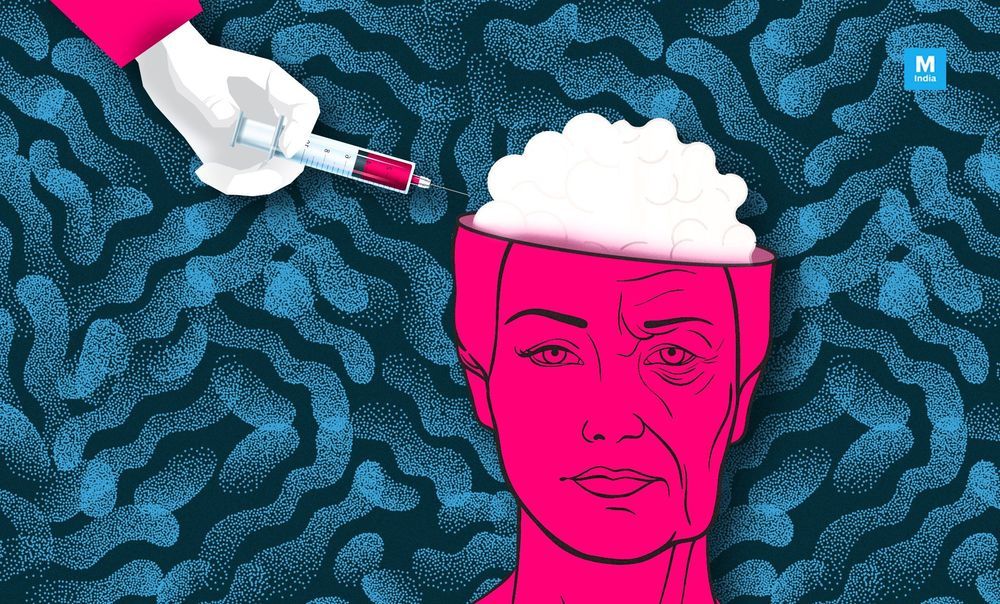Archive for the ‘life extension’ category: Page 415
May 2, 2019
Ira S. Pastor — CEO, Bioquark Inc. — Midnight In The Desert Show — Dave Schrader
Posted by Ira S. Pastor in categories: aging, bioengineering, biotech/medical, business, cryonics, DNA, genetics, health, life extension, singularity
May 2, 2019
Israel fast becoming world hub of aging industry
Posted by Franco Cortese in categories: business, life extension

Eric Kilhstrom (Director of Aging Analytics Agency and former Interim Director of the £98 million Healthy Ageing Industrial Strategy Challenge Fund) is interviewed about the agency’s recent “Longevity Industry in Israel Landscape Overview 2019” report.
New report shows that Israel’s academic and business ecosystem is the optimal base for an internationally recognized longevity industry hub.
Continue reading “Israel fast becoming world hub of aging industry” »
May 1, 2019
Here’s an image of Max More, Natasha Vita-More, Jim Strole, Bernadeane, and myself with the final version of our XPRIZE work at their event yesterday
Posted by Zoltan Istvan in categories: biotech/medical, government, life extension, policy
We submitted the Longevity Peace Prize, worth $5 million dollars to be awarded to any longevity activist(s) in the next 5 years who can get a major world government or the UN to declare “aging a disease” as a policy and to help reverse regulatory hurdles on life extension research. Hopefully, this early version of a prize may one day become reality. https://xprize.org/

April is gone, and before we move on to May, let’s take a look back at the highlights of last month in the rejuvenation world.
LEAF News
May 1, 2019
New video from Undoing Aging 2019: Judy Campisi, Professor at the Buck Institute for Research on Aging, presenting her work on taming cellular senescence, the source of chronic inflammation implicated in major age-related diseases
Posted by Michael Greve in categories: biotech/medical, life extension
undoing-aging.org/…/judy-campisi-presenting-at-undoing-agin…
More info on Forever Healthy: forever-healthy.org
Apr 30, 2019
The April Journal Club will be discussing the recent paper from the Salk Institute
Posted by Steve Hill in categories: biotech/medical, life extension

The findings, published in the journal Nature Medicine, showcase a novel CRISPR/Cas9 genome-editing therapy that can suppress the accelerated aging observed in mice with Hutchinson-Gilford progeria syndrome. This treatment provides an important insight into the molecular pathways involved in accelerated aging, as well as how to reduce toxic proteins via gene therapy. The researchers hope to translate this therapy to humans to potentially provide a cure for progeria as well as possibly slowing down the aging process to delay the onset of age-related diseases in everyone.
Link to paper: https://www.nature.com/articles/s41591-019-0343-4
Abstract.
Apr 30, 2019
You Thought Ageing Can’t Be Reversed? Well, Think Again!
Posted by Genevieve Klien in category: life extension
Apr 30, 2019
NMN Improves Cognitive Function in Aged Mice
Posted by Steve Hill in categories: biotech/medical, life extension, neuroscience
Researchers have tested nicotinamide mononucleotide on aged mice to see if it can help reverse age-related cognitive decline by improving blood flow in the brain.
The brain is a hungry organ
Healthy brain function relies on efficient cerebral blood flow (CBF) to wash away harmful waste products for disposal and supply the brain with an adequate supply of oxygen and sufficient nutrients.
Continue reading “NMN Improves Cognitive Function in Aged Mice” »
Apr 29, 2019
An Interview with Jose Cordeiro
Posted by Steve Hill in categories: bioengineering, biotech/medical, economics, finance, life extension, lifeboat, space

Jose Cordeiro is promoting the development of rejuvenation biotechnologies in Spain and the integration of Latin American immigrants into Spain’s aging society to maintain the country’s productivity. He was at the recent Undoing aging conference in Berlin and gave us an interview about his political goals.
At Undoing Aging 2019, jointly organized by SENS Research Foundation and Forever Healthy Foundation, there was a session focused on the ways to make healthy life extension and medical progress a greater part of the global agenda. Among the speakers there was Jose Cordeiro, the vice chair of Humanity Plus, director of The Millennium Project, fellow of the World Academy of Art and Science, and board member of the Lifeboat Foundation.













